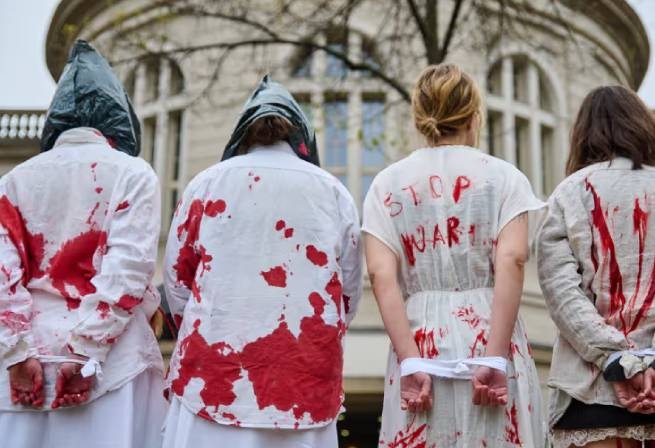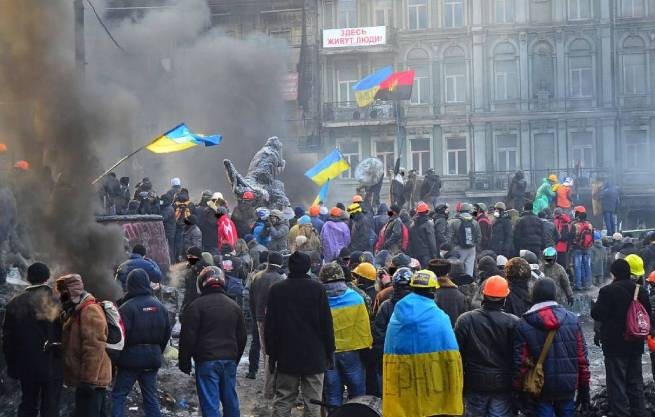Speaking to the nation on the Day of Dignity and Freedom, President of Ukraine Vladimir Zelensky said:
“Ten years ago, the Ukrainians carried out their first counter-offensive. Against lawlessness, attempts to deprive us of a European future. Against our captivity. Ten years ago, people united not only against something, but above all for themselves. Each for each. The Ukrainian people have already overcome a long stretch of the European integration path, and if 10 years ago this was an ambitious goal, today these are realities in which it is no longer possible to stop our movement forward and overcoming all mandatory stages. Therefore, our candidate status and further accession negotiations must necessarily end with Ukraine’s full membership in EU. And we do all this despite the war. When our people defend both themselves and Europe now.”
BBC publication remembers that day, November 21, 2013, is warm and rainy. A protest action began in the center of Kyiv, which would later be called Euromaidan or “Revolution of Dignity.” Without exaggeration, it will change the future of not only Ukraine, but the whole world.
10 years have passed since that day – a significant period, especially taking into account the events of today, but it seems as if all this was just yesterday:
- The sudden and inexplicable decision of the Cabinet of Ministers to stop the process of preparation for the signing of the Association Agreement with the European Union, the first few protests in major cities.
- An unmotivated surge of violence on the part of law enforcement officers in the early morning of November 30 on Maidan Nezalezhnosti. Anger and desire for revenge were in the air of autumn Kyiv. And on December 1 – the “March of Millions”, which resulted in the famous bulldozer assault on Bankova and another beating of activists.
Every day the Maidan grew: from one tent in the center of the capital it grew into a full-fledged “state within a state”, where it had its own rules, and at the forefront was the spirit of mutual support in order to achieve the main goal. Moreover, for each of the participants in the revolution it was different: some strived for Europe and democracy, some wanted to completely break all ties with autocratic Russia, some simply wanted to replace one president with another.
Three months of confrontation ended in a bloody massacre on February 18-20, 2014. Then, approximately 50 protesters were killed in the center of Kyiv, in total the number of victims was about 100 people, including the dead law enforcement officers.
But despite everything, the revolution won. President Yanukovych fled to Russia, where he remains to this day. Members of parliament recognized him as having resigned from his duties as president. The authorities in Ukraine changed to pro-European ones, and criminal trials began against law enforcement officers who took part in the suppression of the Maidan.
Many active protest participants went into politics, others went straight to the front. It was the Maidanites who became the driving force of the new Ukrainian army and continue to be so.
It cannot be said, the publication notes, that the attitude towards Euromaidan is unambiguous in Ukrainian society: 67% of Ukrainians consider these events “a just uprising of the people against the authoritarian government,” but 12.3% are still confident that it was a coup d’etat, a survey by the Democratic Foundation showed Initiative” named after Ilk Kucheriv together with the sociological service of the Razumkov Center.
This is a thesis that Russian President Vladimir Putin has been persistently promoting for the past 10 years. He has repeatedly justified the occupation of Crimea and the full-scale invasion of the Russian Federation precisely by the fact that in 2014 the West allegedly deceived him and forcibly achieved a change of power in Ukraine.
The turbulent events of 10 years ago have already migrated to the pages of history textbooks. But it doesn’t leave me with the feeling that they still haven’t come to an end. And it’s not just about the fact that not a single one of the perpetrators of bloody crimes during the Maidan was punished. Hundreds of criminal cases and trials that began after those events never ended in anything.
The apotheosis was the court verdict against the Berkut members who carried out the shooting on Maidan Nezalezhnosti on February 20, 2014. Formally, the court found some of them guilty of premeditated murder. But these defendants have already fled to Russia four years ago, taking advantage of the opportunity during the exchange of prisoners. Those who did not escape, the court decided not to arrest, citing the lack of evidence of their involvement in the murders.
Apparently, the paradox of the memory of the Maidan is that its participants and witnesses do not have the feeling that everything is over. This means that the struggle for a “happy Ukraine of the future” continues, and it is too early to talk about the results.







More Stories
Belarus is ready to fight, having adopted a new doctrine
IMF: "Huge US debt poses serious risk to global economy"
Teenager arrested in Paris: he wanted to “die as a martyr” at the Olympic Games (video)